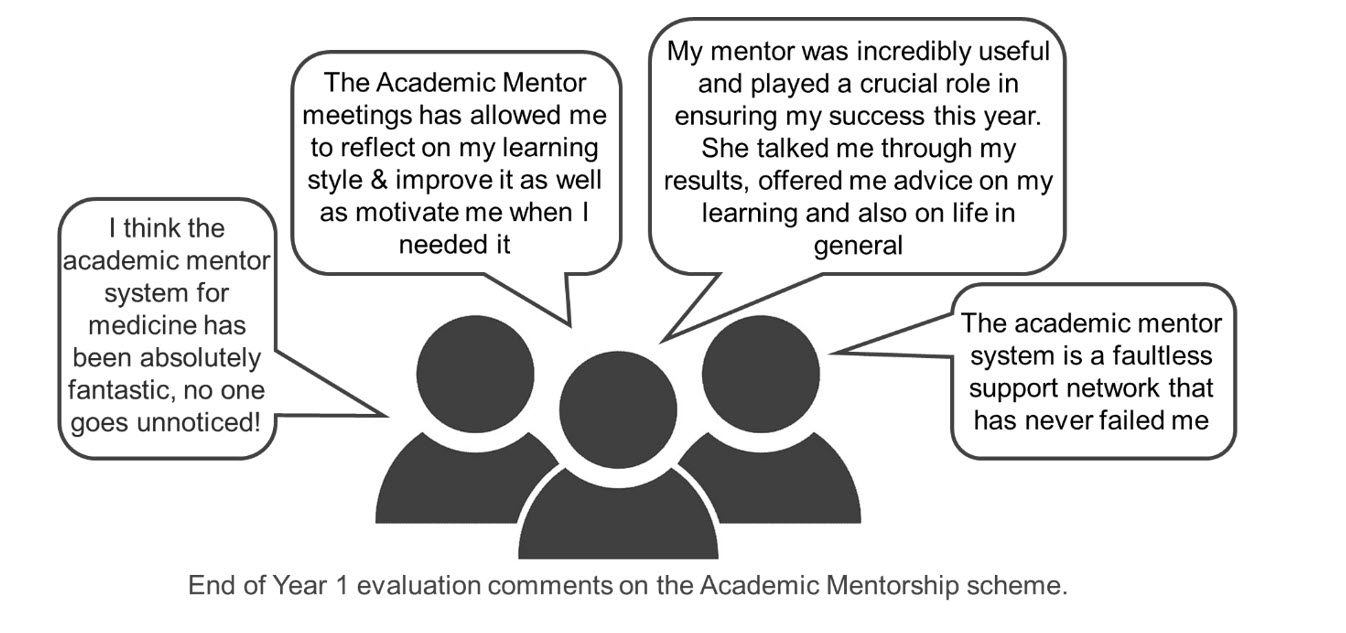David Kennedy
School of Medical Education
Faculty of Medical Sciences
Who was involved?
David Kennedy, Deputy Head of School of Medical Education.
What did you do?
Personal Tutoring was subsumed by Academic Mentorship in which trained School-based staff support the professional and academic development of their mentees, as well as offering pastoral support. They are the students primary port of call for advice and support.
Why did you do it?
Personal Tutoring was ineffective. Meetings between tutees and their tutors had little focus or perceived value leading to poor uptake and the establishment of few meaningful relationships. Against a key performance indicator, the School had the lowest percentage (15.75%) of students in the University who had at least one meeting recorded in semester 1 of Stage 1.
Many tutors had little, or no, involvement with the medical degree programme and had no access to information about student progress on the course to facilitate meaningful discussion.
Evaluation of personal tutoring was poor, with 35-45% satisfaction in end of year evaluation. Free text comments also revealed that a number of students felt disconnected from the Faculty and that they were seen as just a number. This was an important issue to address, particularly as we were facing a 50% expansion in students entering Stage 1 (to an intake of 367).
As a School, we had a desire to improve academic and professional development, as well as pastoral support, for all of our students to enable them to achieve their true potential and support their transition to the workplace.
How did you do it?
Academic Mentors listen to, support, and signpost students in difficulty to relevant services. Academic Mentors also monitor and discuss with their mentees issues of engagement and performance, encourage development through creation of learning plans, and provide guidance in relation to policies and procedures.
Mentees have regular timetabled meetings with their mentor, each of which has a defined purpose. The first is a mentor group meeting scheduled at induction with subsequent one-to-one meetings scheduled around assessment results and at the end of each semester, the end of year discussion being an appraisal format. Further intervention and/or support discussions take place as and when required by the mentee or mentor.
To facilitate meaningful discussion, we developed a portfolio of engagement and progression data that is shared between mentor and mentee. Information within the portfolio includes:
• Information held in the student record (SSP’s, Occ Health, notes/docs).
• Attendance, engagement and professional behaviour data.
• Assessment results and feedback.
• Practical skills sign-off collected through a mobile application
• Mandatory training records.
• Reflections and learning plans.
Mentors are not only expected to monitor and discuss engagement and progress with their mentees, but are also required to interact with aspects of the portfolio. For example, mentors verify their mentees have met the requirements of mandatory training (e.g. ED&I, first aid, and infection control training).
Does it work?
Student evaluation, portfolio usage metrics, and academic performance were used to measure the impact of implementing Academic Mentorship.
Academic Mentorship led to a significant improvement in student satisfaction in comparison to Personal Tutoring. The figure below compares Personal Tutoring (red, n=192) to Academic Mentorship (blue, n=269) in end of Stage 1 evaluation.
The school moved from being the worst performing to the best performing in relation to the Personal Tutoring KPI, with 99.73% of students having at least one meeting recorded in e-portolio within the first 4 weeks of semester 1 in Stage 1. The University average was 55.2%, no better than the previous year, against a target of 70%.
There was a 10-fold increase in reflections recorded in the e-portfolio (1,495 to 14,302), 10,771 clinical skills were signed off via a mobile application and stored/presented within the portfolio, and over 4,000 mandatory training packages were verified by Academic Mentors as being completed by their Stage 1 mentees.
Although this initiative increased workload when compared to Personal Tutoring, mentors very much valued the opportunity to work more closely with their mentees, getting to know them better as people and through supporting their educational experience and development.
Academic Mentorship was a key change introduced and embedded within the medicine programme as we implemented our renewed curriculum. No significant changes were made to the format or content of the single best answer/multiple choice exam (SBA) or observed practical clinical skills exam (OSCE). We have however observed a diminished performance gap between different groups in these assessments which we attribute to the enhanced support, advice and guidance that Academic Mentorship offers to all of our students.
Student Voice
Student comments from end of Year 1 evaluation on introduction of Academic Mentorship.
“I think the academic mentor system for medicine has been absolutely fantastic, no one goes unnoticed!”
“The Academic Mentor meetings has allowed me to reflect on my learning style & improve it as well as motivate me when I needed it”
“My mentor was incredibly useful and played a crucial role in ensuring my success this year. She talked me through my results, offered me advice on my learning and also on life in general”
“The academic mentor system is a faultless support network that has never failed me”
Graduate Framework
This approach develops the following attributes:
- Reflective and self-aware
- Resilient
- Confident
Find out more about the Graduate Framework.


